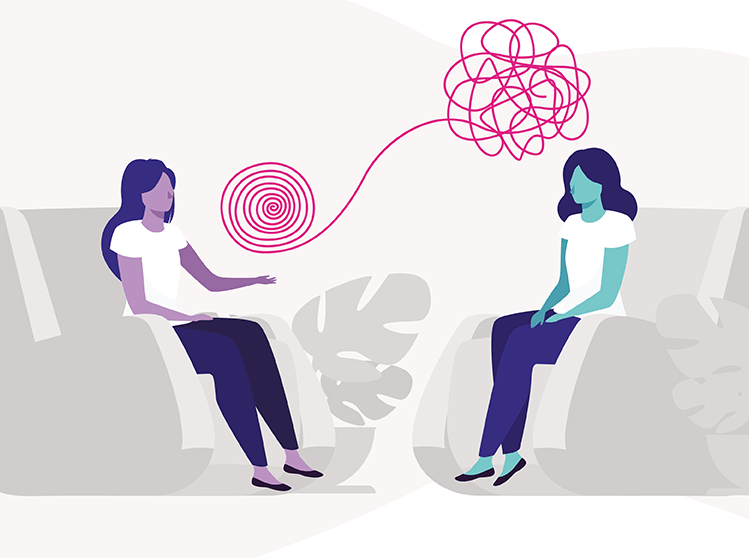Comprehensive Inpatient Mental Health And Wellness Services for Effective Treatment
Inpatient psychological health and wellness solutions represent a vital element of the medical care system, offering a organized and intensive atmosphere for individuals experiencing severe psychological distress. Discovering the subtleties of this continuum exposes significant implications for both specific recuperation and wider mental health end results.
Understanding Inpatient Mental Wellness Services
Inpatient mental wellness solutions offer crucial support for people experiencing extreme mental distress that can not be handled effectively in an outpatient setup. These services are designed to use an intensive level of care in an organized environment, often within a health center or specialized center. Patients confessed to inpatient programs usually show intense signs, such as suicidal ideation, serious depression, or psychosis, demanding round-the-clock surveillance and intervention.
The admission procedure typically entails an extensive analysis by mental wellness professionals, that evaluate the person's mindset, background, and immediate requirements. As soon as admitted, individuals participate in a range of therapeutic methods tailored to their particular needs, consisting of medicine administration, specific therapy, and team sessions. This holistic method intends to stabilize the client's problem, advertise safety, and foster coping skills.
Inpatient psychological health solutions not only address instant wellness issues yet also work as a bridge to recurring treatment. By providing a controlled atmosphere, these solutions promote the advancement of therapy strategies that can be proceeded in outpatient setups, thus making sure a continuum of treatment and boosting lasting outcomes for individuals with complicated mental health and wellness demands.
Trick Elements of Effective Therapy
Reliable treatment in inpatient mental health services comprises several essential components that foster recovery and stabilization. A detailed analysis is necessary to recognize the individual's particular needs and challenges. This analysis educates the growth of a customized therapy plan, which serves as a roadmap for treatment.
Another critical part is the multidisciplinary group strategy. Collaboration among psychiatrists, psychologists, registered nurses, and social employees makes sure that various viewpoints add to the client's treatment, enhancing the performance of treatment. Evidence-based therapeutic methods, such as cognitive-behavioral therapy (CBT) and dialectical behavior modification (DBT), are additionally important, offering organized methods that address maladaptive idea patterns and behavioral concerns.

Finally, a concentrate on aftercare planning is critical to make sure a seamless change to outpatient services, minimizing the threat of relapse and promoting lasting health. These collective elements create a reliable treatment structure within inpatient mental wellness services.
Advantages of Comprehensive Care

Extensive care in inpatient psychological wellness services provides many advantages that substantially boost client results. One of the main benefits is the all natural approach to treatment, attending to not just the psychological symptoms however likewise the physical, social, and psychological demands of people. This comprehensive evaluation permits customized treatments that advertise total health.
Another benefit is the integration of multidisciplinary teams, which fosters collaboration among medical care professionals. This collaborative setting makes sure that people obtain worked with treatment, lowering the threat of fragmented therapy and boosting communication among caretakers. In addition, thorough treatment assists in continuity of services, permitting seamless changes from inpatient to outpatient settings, which is important internet for long-lasting healing.

Last but not least, the organized setting of detailed inpatient treatment provides a safe space for people to involve in healing tasks, assisting them create dealing methods and durability. Collectively, these benefits add to extra efficient treatment and improved top quality of life for people experiencing psychological wellness dilemmas.
Evidence-Based Healing Approaches
In the realm of mental health treatment, evidence-based healing strategies play a crucial function in guaranteeing that clients receive reliable and clinically supported treatments. These strategies incorporate the most effective readily available research study with scientific competence and client worths, promoting a customized therapy experience that addresses specific needs.
Cognitive Behavior Modification (CBT) is just one of the most commonly identified evidence-based methods, concentrating on determining and transforming negative thought patterns and actions. This organized approach has shown efficiency in treating conditions such as stress and anxiety, clinical depression, and ptsd. Dialectical Behavior Therapy (DBT) is particularly effective for individuals with borderline personality problem, stressing the development of emotional policy and interpersonal effectiveness abilities.
In addition, drug administration is usually an essential part of evidence-based therapy, as psychotropic medicines can relieve signs and symptoms and boost general functioning. Collaborative care versions, which entail multidisciplinary groups, even more enhance the efficacy of inpatient solutions by ensuring thorough analyses and constant monitoring.
Ultimately, the integration of evidence-based healing strategies not just promotes positive medical outcomes yet likewise empowers patients, cultivating a sense of firm and durability in their mental wellness journeys.
Transitioning to Outpatient Assistance
The shift from inpatient psychological health and wellness services to outpatient assistance marks a critical stage in a client's recuperation journey. This duration needs cautious planning and coordination to make sure continuity of treatment and to mitigate the threats of relapse or dilemma. Effective discharge preparation should begin early in the inpatient stay, involving a multidisciplinary group that includes psychiatrists, psycho therapists, nurses, websites and social employees.
Key aspects of an effective shift consist of the development of a detailed aftercare plan customized to the person's particular demands. This plan must lay out follow-up appointments, medicine monitoring, and therapeutic treatments, along with identify community sources and support system that can help with recurring recovery.
Furthermore, individual and family members education is important throughout this stage. Recognizing the indicators of potential problems and the value of sticking to therapy can encourage patients and their support systems.
Routine follow-up and review of the outpatient strategy are important to address progressing obstacles. By cultivating a joint relationship in between inpatient and outpatient companies, the probability of continual recuperation rises, inevitably boosting the person's lifestyle and decreasing the danger of readmission.

Final Thought
In summary, extensive inpatient mental health services provide a vital structure for attending to serious mental distress with a multidisciplinary method. Inevitably, such thorough treatment is essential for lasting mental wellness and health.
The admission procedure normally includes an extensive assessment by mental wellness specialists, who evaluate the person's psychological state, history, and immediate needs.Reliable therapy in inpatient mental health solutions makes up a number of key parts that promote healing and stabilization.Comprehensive care in inpatient psychological health and wellness services supplies many benefits that significantly boost individual outcomes.The change from inpatient mental health solutions to outpatient support notes an important phase in a patient's healing journey.In recap, extensive inpatient psychological health and wellness solutions use an important structure for dealing with severe emotional distress with a multidisciplinary approach.
Comments on “Benefits of Choosing Quality Inpatient Mental Health Treatment”